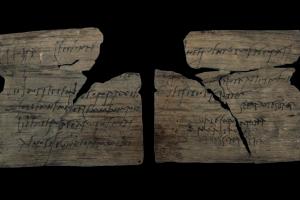Spring 2026
This course presents an overview of the highlights of Roman civilization with an emphasis on major literary works and how they reflect Roman culture. The discussion sections will provide supplementary information and an opportunity to discuss topics addressed in the lectures.
Telling stories is one of the most common ways that humans make sense of the world and their lives in it. For the ancient Greeks and Romans, these stories were very often in the form of tales of the adventures, triumphs and sufferings of gods and heroes – what we call classical myths. This class examines many of these myths, what they meant to Greeks and Romans, and what they still mean for us.
An introduction to ancient Greek philosophy through study of Plato, Aristotle, and the most important of the schools of thought that succeeded them (Epicureans, Stoics, and Sceptics).
An introduction to the political thought of Ancient Greece through study of Thucydides, Plato, and Aristotle.
Understanding Greek and Roman magical practices in their cultural contexts from about 750 BCE - 400 CE. Topics include witches, holy men, love spells, necromancy, spirits, and mystery religions, as well as how magic related to religion and philosophy.
This course will study sexuality and gender in two very different historical periods—ancient Greece and 19th-century Europe. We will read literary texts, historical documents, and critical essays to constitute a comparative analysis of systems of gender and sexuality.
This course will examine the sacred spaces of ancient Greece, with particular emphasis on the origins, structure and evolution of cult sites, on the diverse ritual practices and sacred festivals associated with different divinities and geographic regions, on the range and importance of votive dedications as religious offerings as well as works of art, and on the development of monumental architecture to meet the needs of ancient Greek worship.
This course is the second part of a two-semester sequence that will enable you to start reading unabridged texts in ancient Greek, the language of Homer, Sappho, Sophocles, and Plato. While the focus of the class will be on mastering this nuanced and evocative language, it will also introduce you to key themes and elements of ancient Greek literature and culture.
In this course, we will read selections from Homer’s Odyssey in Greek, as well as the entire poem in English translation. We will (1) develop an understanding of the syntax, vocabulary, dialect, and meter of Homeric Greek, (2) discuss the Odyssey as a work of literature and poetry, with attention to issues of narration and style, and (3) gain familiarity with key questions and debates in Homeric scholarship. Students should have previously completed GREEK 100 or the equivalent.
What do a Christian martyr and a Cynic “scoundrel” have to do with each other?
Latin 2 is the second half of a two-semester language sequence preparing students to read Classical Latin. The course focuses on the dialect of Latin used by authors such as Caesar, Cicero, Vergil, and Ovid.
In this course, we will read extensive portions of Vergil’s Aeneid in Latin. Our primary aim is to enjoy reading Vergil’s poetry and we will focus on acquiring the linguistic competence and literary critical skills needed to appreciate the text.
An exploration of Ovid’s Metamorphoses via close reading of selected episodes in Latin and longer sequences in translation.
Selected readings in the canon of 20th-century theory, coupled with examples of classical scholarship that more or less self-consciously put these theories to work.
This graduate seminar explores Hellenistic poetry through the concept of “geopoetics,” examining how questions of geography, environment, and place shape literary production in the aftermath of Alexander’s empire. We will consider how poets such as Callimachus, Theocritus, and Apollonius of Rhodes represent and re-organize space across multiple dimensions: the urban environment of Ptolemaic Alexandria; imperial, colonial, and local geographies; mythological and fictional (especially bucolic) landscapes.
The seminar, open to graduate students from all disciplines, will consider the virtues and risks of “tarrying with the negative” (Hegel) as a principle of theoretical, political, and ethical critique.
This course will examine uses of ancient Greek and Roman Classics in the literatures, arts, and thought of Africa and the Black diaspora. We will analyze how African and black diasporic authors and intellectuals have engaged with, revised, and re-imagined the classics of ancient Greece and Rome, both to expose and critique discourses of racism, imperialism, colonialism, and as a rich source of radical self-expression and intramural critique. The course is offered as a research seminar with an incorporated pedagogy workshop: one of the coursework assignments is to develop a syllabus for a course on an aspect of Black classicisms that you might teach in the future.
PLEASE NOTE: THIS COURSE REQUIRES KNOWLEDGE OF LATIN. To deepen our understanding of and confidence with Latin, we will undertake a systematic survey of its syntax and idiom. We will not only talk about these matters, read them described, and see examples of them in Latin texts, but also put into practice our knowledge by using the language, in ways consistent with the broad outlines of prose usage in classical Latin, to articulate and communicate ideas in writing.














